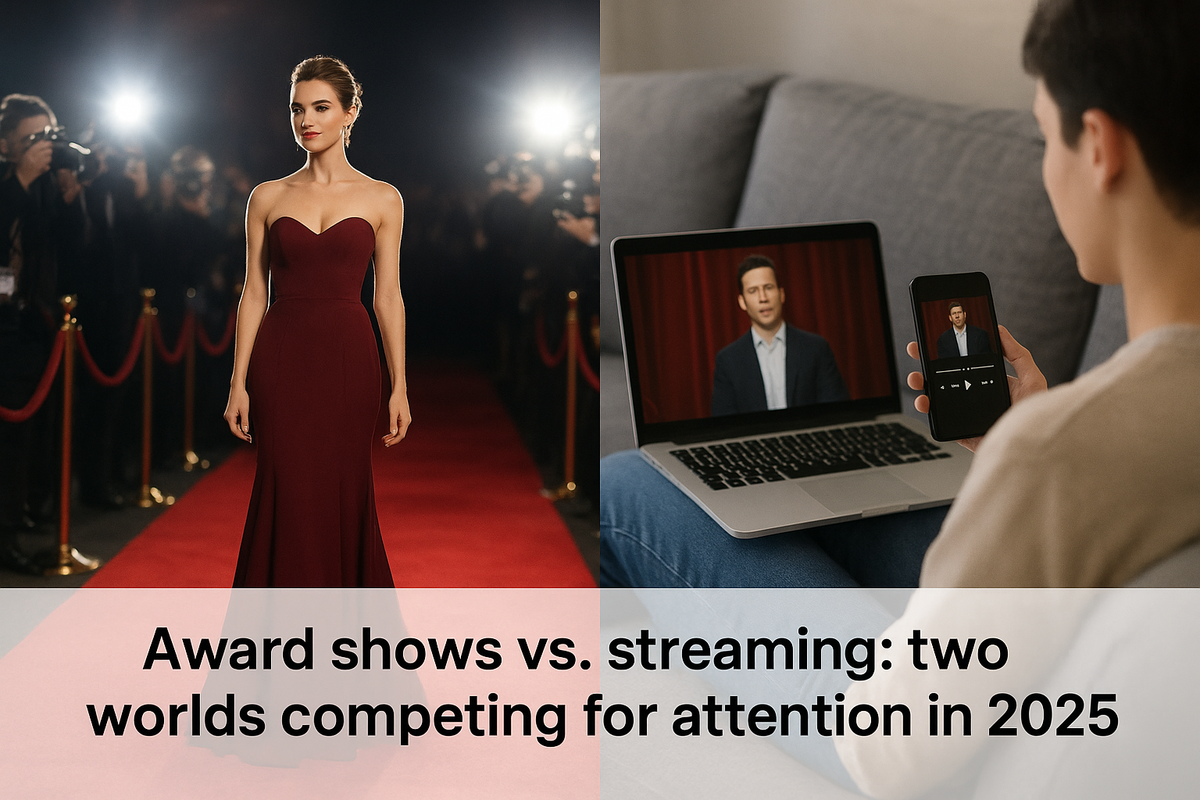Award Shows in Crisis: Do They Still Matter in the Streaming Era?
Award shows once defined cultural prestige, but in the streaming era, dwindling ratings, diversity crises, and shifting fan-driven metrics raise the question: do they still matter or need reinvention?

Introduction: Glitter Losing Its Shine?
Once upon a time, award shows were unmissable. Families gathered around TVs, rooting for their favorite actors, musicians, or athletes. A golden statue or a shiny trophy wasn’t just recognition it was the pinnacle of success. Red carpets turned into global fashion runways, acceptance speeches sparked cultural conversations, and ratings soared.
But in 2025, something feels different. Viewership is down. Younger audiences are scrolling TikTok instead of watching the Oscars. Controversies over bias, lack of diversity, and political speeches overshadow the very art being celebrated. Meanwhile, streaming platforms are offering audiences direct access to movies, concerts, and even alternative fan-voted awards.
So the burning question is: do award shows still matter in the streaming era or are they relics of a fading tradition?
The Golden Age of Award Shows
To understand their crisis, we must first remember their glory.
- The Oscars became the ultimate dream for filmmakers. Winning “Best Picture” could transform a small indie film into a box office hit overnight.
- The Grammys crowned musicians, often defining careers with just one golden gramophone.
- The Emmys validated television creators, at a time when “prime-time TV” was the cultural heartbeat.
For decades, award shows were cultural anchors. They offered a rare, collective viewing experience in a fragmented media landscape. Their prestige shaped careers, gave industries legitimacy, and connected fans to their icons.
But the media landscape has shifted dramatically.
Ratings Freefall: The Audience Has Left the Building
Award shows are struggling where it hurts most: viewership.
- The Oscars, once drawing 40+ million viewers, have recently struggled to cross 20 million.
- The Golden Globes faced boycotts, scandals, and declining network interest.
Even the Grammys, fueled by live performances, struggle to connect with Gen Z.

Younger audiences are not tuning in. Why?
- Length – A four-hour telecast feels endless in an age of 15-second reels.
- Relevance – Streaming platforms have fragmented viewing habits. Not everyone has seen the same nominated shows or films.
- Authenticity – Audiences increasingly see awards as politics, lobbying, or PR machines rather than genuine recognition of talent.
- Accessibility – Clips of best moments go viral online the next morning. Why sit through the whole show?
Award shows used to be “events.” Now they’re just another piece of content in a crowded, always-on entertainment ecosystem.
Streaming Platforms: The New Judges of Relevance
Netflix, Prime Video, Apple TV+, Disney+, and a dozen others have not only disrupted how content is consumed they’ve changed what audiences consider prestigious.
- Streaming Originals Win Big – Netflix’s Roma (2019), Apple’s CODA (2022), and Prime’s The Marvelous Mrs. Maisel proved streaming content can dominate awards.
- But Do Audiences Care? While Hollywood obsesses over which platform wins, viewers care more about binge-watching and discovering content than who gets the trophy.
- Fan-Driven Prestige – Shows like Squid Game or Wednesday didn’t need award shows to prove cultural impact. Social media metrics memes, hashtags, fan edits became the new awards.

In short, streaming redefined success. Awards remain industry accolades, but fans decide prestige in real time.
The Diversity & Credibility Crisis
Award shows have also faced their fair share of scandals.
- The Oscars’ Diversity Issue – The hashtag #OscarsSoWhite sparked global outrage, forcing rule changes.
- The Golden Globes’ Corruption Allegations – Lack of diversity in the Hollywood Foreign Press Association and pay-to-play rumors tarnished credibility.
- Gender & Genre Bias – Critics argue that comedies, horror, and superhero movies rarely get fair recognition compared to “serious dramas.”
Audiences are no longer forgiving. In the streaming era, transparency matters. If the awards feel rigged or elitist, fans disengage.
Fan-Powered Alternatives: The Rise of Social Awards
In contrast, fan-voted awards are thriving:
- The People’s Choice Awards – Often mocked as less prestigious, but now more aligned with social media culture.
- MTV Awards & Teen Choice Awards – Cater directly to fan enthusiasm.
- Social Media Platforms – TikTok trends, YouTube views, and Spotify streams sometimes mean more to artists than a Grammy.

For younger generations, engagement is the trophy. Being the most-streamed artist on Spotify or the most-memed show on Twitter has real-world impact, often more than winning a statue.
Why Award Shows Still Matter (For Now)
Despite their crisis, award shows aren’t dead yet. They still hold certain powers:
- Industry Validation – For creators, awards can mean bigger budgets, more freedom, and recognition from peers.
- Cultural Conversations – Viral acceptance speeches (think Michelle Yeoh, Joaquin Phoenix, Bong Joon-ho) still spark global debates.
- Fashion & Branding – Red carpets remain invaluable marketing stages for fashion houses, jewelry brands, and celebrities.
- Global Reach – Winning an Oscar or Grammy can still introduce an artist to millions of new fans worldwide.
Award shows may no longer be the only measure of success, but they still provide legitimacy in industries where visibility is everything.
Reinventing the Spectacle: Can Award Shows Evolve?
To survive, award shows must embrace the streaming era instead of fighting it. Possible changes include:
- Shorter, Punchier Formats – Two hours max, with more focus on performances and less on filler.
- Digital Integration – Live TikTok updates, Instagram collaborations, and YouTube highlights designed for viral sharing.
- Global Inclusion – Recognizing international talent from K-dramas, Nollywood, Bollywood, and beyond.
- Transparency in Voting – Clearer processes and diverse voting panels to rebuild credibility.
- Interactive Viewing – Let fans vote live on side categories, gamifying the experience.
- Hybrid Access – Broadcasting both on TV and streaming platforms simultaneously, with exclusive behind-the-scenes for digital audiences.
Looking Ahead: The Future of Prestige
We may be moving toward a hybrid era:
- Traditional Awards like the Oscars and Grammys will survive as industry benchmarks.
- Fan-Driven Metrics like streaming numbers, social trends, and digital fandoms will coexist as cultural validation.
- New Platforms may emerge, blending the two: part jury, part fan vote, fully digital-first.
In other words, prestige is no longer owned solely by golden statues. It’s shared between red carpets and hashtags, between industry insiders and everyday fans.
Conclusion: Do They Still Matter?
The short answer: Yes, but not in the same way.
Award shows still carry weight in terms of recognition, validation, and legacy. They still offer unforgettable cultural moments. But in the streaming era, their monopoly over prestige has ended.
The audience has more power than ever before. Success is now measured in streams, shares, and social conversations. For many artists, being relevant online matters more than winning gold on stage.
So, while the glitter of award shows may have dimmed, their role is not obsolete it’s just evolving. The real question isn’t whether award shows matter… it’s whether they can reinvent themselves fast enough to matter to the next generation.




